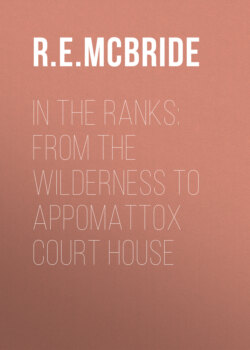Читать книгу In The Ranks: From the Wilderness to Appomattox Court House - R. E. McBride - Страница 8
На сайте Литреса книга снята с продажи.
Chapter II.
ОглавлениеTable of Contents
When the civil war began, my home was with the family of Mr. John Dunn, in Butler County, Pennsylvania. The old gentleman was a Democrat, and at first had little to say about the war. One evening he returned from the village in a state of intense excitement. He had heard of the disastrous battle at Bull Run. It is no exaggeration to say that he "pranced" around the room, chewing his tobacco with great vigor, telling how many of our "poor boys" had been slaughtered by the—— rebels. His apathy was at an end. He could see where the line lay between treason and patriotism, when once that line was traced in blood.
At this time two Butler County companies, C and D, of the Eleventh Pennsylvania Reserve Volunteer Corps, were in camp near Pittsburg. The corps was sent forward to Washington at once, and from that time till the close of their term of service, they gallantly represented the Keystone State in every battle fought by the Army of the Potomac. My brother, Wm. A., was a private in Company C. He enlisted June 10, 1861, and fell, with many other brave men, at the battle of Gaines' Mill, June 27, 1862.
From what I could learn from those who were present, the following are the facts concerning the disaster which befell the regiment in this engagement, and my brother's death:
Late in the afternoon of the 27th, the Eleventh moved forward to relieve a New Jersey regiment, which had been fighting in a piece of woods near the center of the line. The rebels came swarming against them, line after line, but were continually driven back by the relentless volleys that blazed out from the ranks of the Eleventh. Unfortunately, about the time they became engaged, the line on either side of them was driven back, and they were left to contend alone against terrible odds. Neither men nor officers knew their real situation until men began to fall, from volleys poured into them from the flanks. Major Johns went in the direction from which the fire was coming, thinking that some of our own troops were firing on them through mistake. He was made prisoner. Adjutant M'Coy was ordered to report the condition of things to General Mead. On reaching the open ground, he saw the battle flags of nine rebel regiments on the flank and rear. He at once reported to the colonel. Orders were given to fall back, the intention being to hew a way out through the enemy. At this point my brother fell. Having just loaded his gun as the command was given to move toward the rear, he paused to give a parting shot. A bullet struck him in the face, penetrating the brain, and he fell dead.
The regiment, hemmed in on every side by overwhelming numbers, with one-fourth of their number killed or wounded, at last surrendered. Company D lost eight men, killed, in this engagement, besides a number mortally wounded or permanently disabled. Of the former was Jasper Dodds, who was wounded in the knee by a rifle ball. After being removed to Richmond, he wrote a cheerful letter to his mother and friends at home, no doubt expecting to recover. He died July 18th. Jacob Baiers, then sergeant, afterwards promoted to captain, was shot through the lungs, and never wholly recovered. He continued in service, however, until April, 1864. The regiment was exchanged in time to participate in the second Bull Run battle, where again their loss was terrible. Seven men of Company D were killed or mortally wounded. It is said that Jesse Fry and Boss. M'Cullough were the only men of the company on their feet and unhurt at the close of the battle. Scarcely were their ranks somewhat filled up by returning convalescents, when the other great battles followed. On every field they left their dead. "South Mountain," "Antietam," "Fredericksburg,"—these words you can see in the muster roll, after that word which even yet chills the heart, "killed." Captain Stewart was struck through the breast at Fredericksburg, and died in two hours. Young O'Harra Woods was promoted for gallant conduct in this battle. The honor was well bestowed and nobly borne. He fell at Gettysburg, July 2, 1863, bravely leading his men in that great battle. But why particularize; brave men all.
"Theirs not to make reply,
Theirs not to reason why,
Theirs but to do and die.
